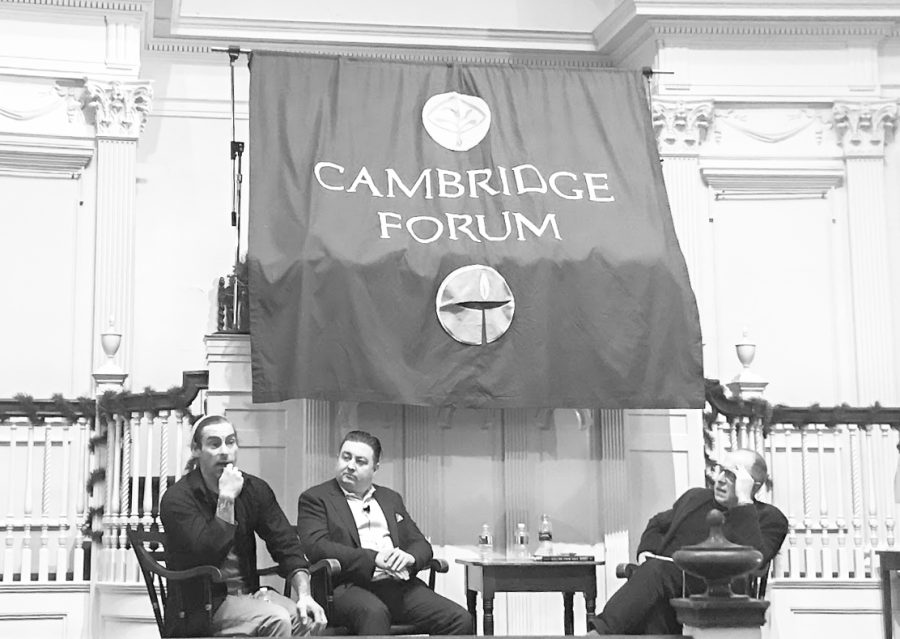A crowd filed into pews on Wednesday at The First Parish church in Cambridge to hear Stony Brook Professor of sociology Michael Kimmel speak on his new book, “Healing from Hate: How Young Men Get Into and Out of Violent Extremism.”
Kimmel brought two former Neo-Nazis, Frankie Meeink and Tony McAleer, to speak on their own experiences with extremism and the contributions they were making to help others leave after exiting themselves. The event had Kimmel speak on his book and the central themes of masculinity, brotherhood and how members can exit extremist groups.
Kimmel’s book hypothesizes that masculinity and gender are pivotal reasons that many young men become involved in extremist groups. Kimmel argues that masculinity is the central role in their personal identity, making the promise that if men join, they will get their manhood back.
“So it seemed to me that there was something missing in our conversation and it was staring us in the face; and that was masculinity,” said Kimmel.
Kimmel believes that masculinity can help establish a space for men to join together in a community of acceptance, creating a visceral and emotional feeling of brotherhood. The acceptance of a hateful ideology comes in later after the sense of validity has been established.
“Gender [and] masculinity are not the only explanation for why people go into the white nationalist movements. But without understanding gender you can’t get the whole picture,” said Kimmel in an interview with The Suffolk Journal.
McAleer’s involvement with an extremist group can be traced to when he was nine years old. He said that after he discovered his father’s infidelity and was beaten in school for his slipping grades, he was transferred to a boarding school in England and became involved with a group of skinheads. It was here where Kimmel believes his findings are proven; McAleer felt a sense of security and community with these other men.
“What I got from it was a sense of camaraderie…brotherhood. I got the feeling of power when I felt powerless, I got acceptance when I felt unlovable, and I got significance when I felt invisible,” said McAleer.
Frankie Meeink then went on to tell his story of how became involved in a group, citing food stamp use and stepfather’s abuse as a rough childhood start. When he became involved with Neo-Nazis in Pennsylvania, Meeink found that sense of parental support he had been missing, a community where the other men cared about what he had to say.
Asma Soltani, a sophomore at Suffolk University majoring in international relations, came at the recommendation of her professor and found the event to be eye-opening.
“Hearing their side of the story I never seemed to think ‘maybe this is important to think about’, you just assume that they did a bad thing… [now] they hold positions of power and it’s good to see they’re doing something about it now, it’s hopeful for the future,” said Soltani
A major topic all three of the guests strongly believed in was the intersection of identity and ideology. Once these men become indoctrinated into the ideology, it become a part of who they are when in the group.
“Identity and ideology become intertwined. When you attack the ideology you attack that person’s identity, that’s never going to persuade someone [to exit the group],” said McAleer.
Both Meeink and McAleer became disillusioned with the extremist groups and exited from them, but the healing process was not an immediate one.
“When I got out of prison I still wanted to be a part of this movement- it was my whole identity. I was an egomaniac,” said Meeink. “It is a gut wrenching heartache when you have to take all the stuff you were just proud of, and you have to take that away from me.”
Meeink detailed how the first step began when he used a derogatory term toward an African American friend in prison making him see the repercussions of his actions. It took him a year to fully disengage from his former mindset.
“Why should I fight for a bunch of white people who couldn’t care whether I lived or died? If I really wanted to save the white race, I’ll focus on these two children, to make sure they survive and thrive,” said McAleer on why he disengaged from the movement, citing the births of his daughter and son as the reasons.
Kimmel also brought up the idea of confrontation of the “other” as a means to breaking down stigmas and stereotypes, believing that people have to be put together in order to understand one another.
Both men now work with Life After Hate, an organization formed in 2011 to help people leave hate groups.













